Heart-Mind 2015 Conference Recap


The Heart-Mind 2015 Conference brought together an amazing group of presenters and facilitators with a passionate audience who all believe in the importance of educating the hearts and minds of our children. We explored the theme of Human Connection in a Digital World and learned how to teach and better raise our children in this technological age. We learned about connection and oxytocin, and how to be positive digital mentors. We learned how to hashtag. We learned more about the Millennial Generation and how to educate children about their online world. And we learned that “the digital world isn’t good or bad – it’s about how we use it.” – Heart-Mind 2015 Attendee.
Friday, October 2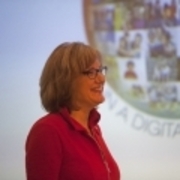
The first day of the Conference introduced our remarkable presenters: Kim Schonert Reichl, Alexandra Samuel, Hannah Berry, Robert Roeser, Jennifer Shapka, Amori Mikami, Deborah MacNamara, and Shelley Moore. Each discussed their areas of expertise and had the audience captivated and excited to learn. With the Dalai Lama Center's moderator Maria LeRose connecting ideas and themes between each presenter, and engaging the audience with her charm and expertise, the day was not only illuminating and informative, it was also a lively and heart-warming atmosphere for the 300+ in attendance.
“Human Connection: What is it and why is it important?” with Kim Schonert-Reichl, explained how we are social animals wired to connect from before we are born. Dr. Schonert-Reichl unraveled recent research findings and discussed what they tell us about how to create contexts where children experience human connection – and flourish.
“Hacking Parenthood: The three worlds of digital parenting” with Alexandra Samuel, shared new research on how thousands of parents address the challenge of parenting in the digital world, and offered a roadmap for parents who want their kids to cultivate meaning, relationship and authenticity in their experiences online and off.
Hannah Berry, an award winning spoken word poet and musician, and an avid writer and reader, gave a reading of her original poem, “Intronet: Poem for Introverts”. Drawing on her experiences as a Millenial child, the poem explores the effect of social media and digital technology on the lives of youth today. Hannah received a rousing standing ovation for her performance!
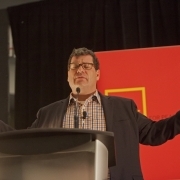 “Mindfulness, Media and the Millennial Generation” with Robert Roeser focussed on how the Millennial Generations (those born from 1980 to the present) are unique in human history with regard to "growing up on-line", and how mindfulness may play an important role in keeping young people grounded in the "here and now" at the same time new technologies allow them to be anywhere, at any time. Roeser drew upon history, psychology, philosophy and other disciplines in his eclectic and animated presentation.
“Mindfulness, Media and the Millennial Generation” with Robert Roeser focussed on how the Millennial Generations (those born from 1980 to the present) are unique in human history with regard to "growing up on-line", and how mindfulness may play an important role in keeping young people grounded in the "here and now" at the same time new technologies allow them to be anywhere, at any time. Roeser drew upon history, psychology, philosophy and other disciplines in his eclectic and animated presentation.
Teens @nd the Internet: Growing up in the Information Age with Jennifer Shapka posited that cyberbullying, while mediated through technology, is ultimately about social relationships. Dr. Shapka discussed ways in which parents and educators can help children and youth navigate online interactions in socially responsible ways.
“Talking to Kids about their Online World” with Amori Mikami brigded the generational gap in technology, explaining that, while most children and teenagers use social media to communicate with peers naturally and easily, their parents and teachers can feel mystified by the technology at times and may wonder how to possibly understand this new world. Researcher and Clinical psychology professor Mikami offered some compelling insights and practical strategies to help parents and educators stay involved and abreast of children's online social communication.
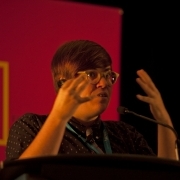 “Raising Children in the Digital World” with Deborah MacNamara stated unequivocally that the digital world is here to stay, changing our society in a way that has far-reaching consequences for our children. She examined what the implications are for raising children, and discussed practical ways to harness the spectacular connecting potential and yet avoid the pitfalls of an over-attachment to, and dependancy on, technology.
“Raising Children in the Digital World” with Deborah MacNamara stated unequivocally that the digital world is here to stay, changing our society in a way that has far-reaching consequences for our children. She examined what the implications are for raising children, and discussed practical ways to harness the spectacular connecting potential and yet avoid the pitfalls of an over-attachment to, and dependancy on, technology.
“What's the Story?” with Shelley Moore was a lively, fun and heartfelt presentation that left many in the audience in tears, from both laughter and empathy with Shelley's story of growing up a misunderstood child. Moore reminded the older generations that, although we are constantly surrounded by information and technology, growing up with low tech communication like writing letters and film photography leaves us in a unique position to analyze the digital world. If we look to technology as a connector and not a reactor, we may start to see how we can use it to help us collect the stories and perspectives we may not have known about, before the days of internet and the digital world.
Saturday, October 3, 2015
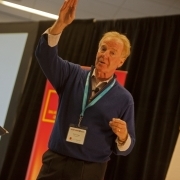 “Systems Thinking in a Digital World” with Dr. Peter Senge, our morning keynote speaker, talked about the importance of teachers and parents in helping kids to step back from the constant bombardment of information in the digital world, and take the time to pause and reflect on the deeper meanings and larger connections in order to understand the systems that frame our society. Without the context and knowledge of systems, it is hard to get a true sense of the implications of the digital world, not just on human connection, but on our global relationships. One stunning example is the effect of technology use -- often promoted as "green" technology -- on the world's resources and climate. The amount of electricity our world consumes just on tech devices (15% of the world's total energy consumption) is doubling every three years, and now equals the same amount of energy that the whole world used in 1985 for ALL purposes! The unintended impacts of this massive and rapid technological shift on climate, infrastructure, energy production, the economy and a host of other important systems cannot be overlooked.
“Systems Thinking in a Digital World” with Dr. Peter Senge, our morning keynote speaker, talked about the importance of teachers and parents in helping kids to step back from the constant bombardment of information in the digital world, and take the time to pause and reflect on the deeper meanings and larger connections in order to understand the systems that frame our society. Without the context and knowledge of systems, it is hard to get a true sense of the implications of the digital world, not just on human connection, but on our global relationships. One stunning example is the effect of technology use -- often promoted as "green" technology -- on the world's resources and climate. The amount of electricity our world consumes just on tech devices (15% of the world's total energy consumption) is doubling every three years, and now equals the same amount of energy that the whole world used in 1985 for ALL purposes! The unintended impacts of this massive and rapid technological shift on climate, infrastructure, energy production, the economy and a host of other important systems cannot be overlooked.
Workshops and Big Conversations, Small Group Sessions
The remainder of Saturday morning the attendees broke out into workshops and Big Conversations, Small Groups. Facilitators and presenters provided attendees the opportunity to take what they learned and apply it to through engaging discussions and hands-on workshops.
“I most enjoyed the breakout session with Monique Gray Smith. It reinforced my goal to put more Aboriginal voices into my curriculum.” - Heart-Mind 2015 Attendee
Closing Plenary
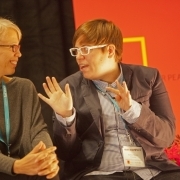 The Conference concluded with a demonstration from our amazing moderator, Maria LeRose, and presenter Shelley Moore. Each woman held an energy ball. Next, we were instructed to form a large circle around the room and hold hands. As each person physically connected with one another, the energy balls lit up. However, as soon as one person broke the chain the balls powered off. The tangible representation of the importance of human connection was incredibly powerful to witness. Without a doubt, Heart-Mind 2015 was a motivational, educational, and inspirational journey for everyone.
The Conference concluded with a demonstration from our amazing moderator, Maria LeRose, and presenter Shelley Moore. Each woman held an energy ball. Next, we were instructed to form a large circle around the room and hold hands. As each person physically connected with one another, the energy balls lit up. However, as soon as one person broke the chain the balls powered off. The tangible representation of the importance of human connection was incredibly powerful to witness. Without a doubt, Heart-Mind 2015 was a motivational, educational, and inspirational journey for everyone.
“The conference changed or shifted my views about the digital world and how it can be a place for human connections and I am personally ready to make changes to my own use of this technology.” - Heart-Mind 2015 Attendee
“Even though I "know" a lot of the content and share many of the values and approaches presented, it's important to listen to and be inspired by experts in other fields. It re-energizes us and encourages us to go away and "do”. - Heart-Mind 2015 Attendee
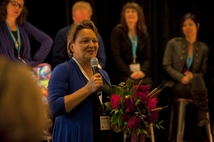
“At Heart-Mind 2015 we, and all those who were there, got to live in and truly experience Heart-Mind well-being. We learned, laughed, cried, reflected and felt what it means to educate our hearts, and why it is so critically important that we pass this along to the children in our lives. I want to send a huge thank you to all who attended and worked on the conference for your part in making that magic.” - Fiona Douglas-Crampton, President and CEO, Dalai Lama Center for Peace and Education
By David Samis and Jordan Lee





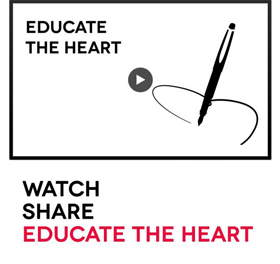
Comments
Post new comment